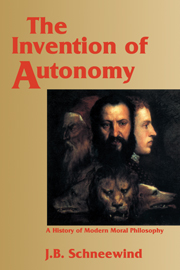Book contents
- Frontmatter
- Contents
- Preface
- Acknowledgments
- A note on references and abbreviations
- Introduction
- Part I The rise and fall of modern natural law
- Part II Perfectionism and rationality
- Part III Toward a world on its own
- 13 Morality without salvation
- 14 The recovery of virtue
- 15 The austerity of morals: Clarke and Mandeville
- 16 The limits of love: Hutcheson and Butler
- 17 Hume: Virtue naturalized
- 18 Against a fatherless world
- 19 The noble effects of self-love
- Part IV Autonomy and divine order
- Epilogue
- Bibliography
- Index of names
- Index of subjects
- Index of biblical citations
18 - Against a fatherless world
Published online by Cambridge University Press: 05 June 2012
- Frontmatter
- Contents
- Preface
- Acknowledgments
- A note on references and abbreviations
- Introduction
- Part I The rise and fall of modern natural law
- Part II Perfectionism and rationality
- Part III Toward a world on its own
- 13 Morality without salvation
- 14 The recovery of virtue
- 15 The austerity of morals: Clarke and Mandeville
- 16 The limits of love: Hutcheson and Butler
- 17 Hume: Virtue naturalized
- 18 Against a fatherless world
- 19 The noble effects of self-love
- Part IV Autonomy and divine order
- Epilogue
- Bibliography
- Index of names
- Index of subjects
- Index of biblical citations
Summary
Kant proclaimed in public the importance for moral philosophy of the work of Shaftesbury, Hutcheson, and Hume. He gave no similar recognition to the work of later British writers on ethics, although he read and admired Adam Smith's Theory of Moral Sentiments in its translation into German in 1770. Smith and two of his contemporaries, Richard Price and Thomas Reid, rejected the enterprise of working out an ethics for a world left on its own, without providential care. They, like the man of benevolence described by Smith, would have found “the very suspicion of a fatherless world … the most melancholy of all reflections” (Theory, p. 235). Kant would have agreed. But we have no reason to suppose that he knew of the moral philosophy of either Price or Reid; and in any case they, like Smith, developed options that Kant did not take. They are important here because their response to the post-Humean situation in moral philosophy helps us to understand the problems that Kant would also have seen.
Sentimentalism, skepticism, and the new rationalism
Shaftesbury, Hutcheson, and Hume were taken by their readers to be proponents of a sentimental theory of morality, making feeling central and reason peripheral to moral judgment and moral principle. The few earlier writers who had challenged the ability of reason to give us effective moral guidance had drawn a skeptical conclusion with real practical implications.
- Type
- Chapter
- Information
- The Invention of AutonomyA History of Modern Moral Philosophy, pp. 378 - 403Publisher: Cambridge University PressPrint publication year: 1997



